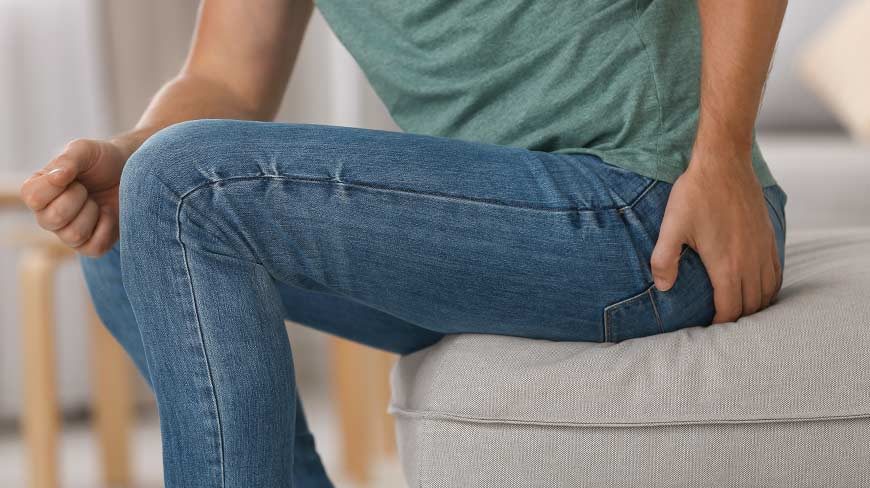What Causes Rectal Pain?
Bathroom issues and bowel symptoms are notoriously uncomfortable topics. Most people feel embarrassed talking about what’s going on down there. That’s usually not a problem – until you’ve got an issue with your anal or rectal area.
As uncomfortable as it can be to talk about, it’s a good idea to talk to your doctor if you’re having pain in your rectal or anal area. Most pain in those areas is harmless, but it can sometimes point to a serious problem.
So, if you cringe at the thought of talking about your rectal or anal pain with your doctor, remember there are worse things than talking about it.
What Causes Anal or Rectal Pain?
The most common causes of anal or rectal pain and pressure are hemorrhoids and anal fissures.
What is a hemorrhoid?
Hemorrhoids are a common condition where veins in the rectum or anus become swollen, painful, and may bleed. They can be external or internal. If they are external, you may feel rectal pain while sitting. Internal hemorrhoids typically cause rectal bleeding with no pain. Hemorrhoids can often be treated with over-the-counter or at-home remedies, but if they become severe enough, they may need surgery.
What is an anal fissure?
Anal fissures are rips or tears in the lining of the anus. They can be caused by chronic constipation or diarrhea, straining to have a bowel movement, large or hard stools, medical problems, and more. The cause often determines how to heal an anal fissure and prevent more from forming. Treating the underlying cause can prevent more fissures. If constipation or diarrhea is the cause, taking a stool softener or anti-diarrheal can help. A sitz bath may ease the discomfort of a fissure and help it heal in the meantime.
Other possible causes of anal or rectal pain include:
Diarrhea – Bile, digestive enzymes, and stomach acid in diarrhea can cause burning.
Constipation – Difficulty passing stool, or hard stool, can cause pain and fissures.
Infection – Fungal, bacterial, viral, or wart infections can be transmitted sexually and can cause anal pain.
Perianal abscess – An abscess is a blocked gland that results in an infected cavity. You may notice it as a painful lump like a pimple.
Inflammatory bowel disease (IBD) – Ulcerative colitis and Crohn’s disease can both cause anal and rectal pain.
Skin conditions – Psoriasis and other skin conditions can affect the sensitive skin in the anal area. The bleeding, itching, and pain may come and go. Treatment depends on the condition, so it’s important to see your doctor for a diagnosis.
Anal sex – Anal sex can cause pain and anal fissures and worsen issues like hemorrhoids.
Anal cancer (rare) – Most anal or rectal pain is not cancer, but cancer can cause pain that keeps getting worse.
Can I Treat Anal or Rectal Pain Discreetly, At Home?
Pain from constipation, hemorrhoids, diarrhea or mild skin irritation can be treated with over-the-counter medications or lifestyle changes. If home treatments don’t work or if you aren’t sure what’s causing your pain, it’s important to be evaluated by a doctor.
Talking to a doctor about anal and rectal pain can be uncomfortable, but seeing a doctor for diagnosis and treatment can save you from worsening symptoms.
When To Call the Doctor
Most of the time, the causes of discomfort in your anal or rectal area are short-lived. If you feel better in a day or two, you can relax – but pay attention to whether the discomfort comes back. If it does, you should see your doctor for an evaluation and treatment recommendation. Sometimes even a harmless issue needs to be under a doctor’s care to prevent it from worsening.
You should always call your doctor if you’re experiencing pain that is severe, happens with a bowel movement, or lasts longer than a couple of days. And always call your doctor if you’re bleeding or can feel a mass that doesn’t go away.
Chances are, it’s not too serious and can be treated successfully. But sometimes, pain down there can be a sign of something more, and getting early treatment typically has a better outcome.
When It’s an Emergency
It’s possible for anal or rectal pain to be an emergency. If you have significant bleeding or severe pain that spreads or comes with chills, fever, or anal discharge, have somebody drive you to the emergency room or urgent care.
Does Pain Mean I Have Anal Cancer?
Although anal cancer is rare, it does share some of the same symptoms as other anal and rectal issues. Many people with anal cancer initially assumed hemorrhoids caused their symptoms. Anal cancer symptoms can include:
- A mass on or near the anus
- Changes in your bowel movement, especially narrow, ribbon-like stool
- Feeling “full”, like you need to have a bowel movement
- Incontinence
- Pain
- Rectal bleeding
- Rectal itching
- Swollen lymph nodes near the groin or anus
- Unusual anal discharge
People tend to assume that anal cancer is the same as rectal and colon cancer, but the cells that become cancerous are different. Rectal and colon cancer are more similar to each other than to anal cancer. In fact, colon and rectal cancers are often referred to together as colorectal cancer.
The best course of action with any anal or rectal symptom is to see your doctor for an assessment. Anal and colorectal cancer treatment is typically very successful when found and treated early.
Don’t wait to talk to a doctor about your rectal or anal pain – schedule an appointment now!
Request Appointment


